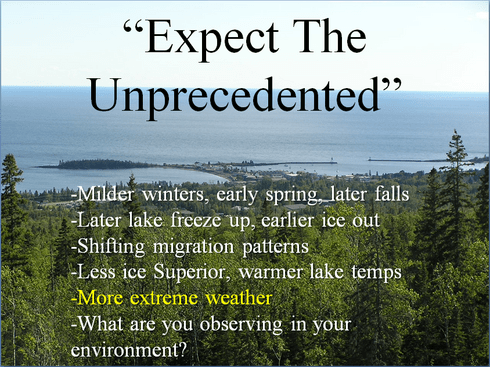Swimming anyone? Lake Superior water temps warmest in a century

74.8 degrees - Surface water temp on Lake Superior near Duluth this morning
70s - water temps along the North Shore from Duluth all the way to Grand Marais
"It's pretty safe to say that what we're seeing here is the warmest that we've seen in Lake Superior in a century," said Jay Austin, a professor at the University of Minnesota at Duluth, who has researched the lake's water temperatures back to the beginning of the 20th century.
Create a More Connected Minnesota
MPR News is your trusted resource for the news you need. With your support, MPR News brings accessible, courageous journalism and authentic conversation to everyone - free of paywalls and barriers. Your gift makes a difference.
Excerpt from Andrew Freedman's Climate Central piece on record Great Lakes water temps in 2012
The all-time daily average high temperature record for Lake Superior is 71°F, which was recorded in mid-August 2010. With a few more weeks of warming left, that record is in jeopardy.
"The season hasn't played itself out yet and we're already within 3 degrees of the all-time daily record surface temperature," Austin said.
-Mild winter, less ice cover & Duluth Flood played a role: Details below
Source: Paul Huttner-MPR News
Swimming in Superior anyone?
In another sign of just how crazy warm 2012 has been in Minnesota and the nation, water temps are at record levels on Lake Superior and the Great Lakes this summer.
Source: NOAA/Climate Central
Surface water temps in the "swimmable" 70s now stretch from Duluth all the way to Grand Marais. A small bubble of water has even reached 75 degrees just east of Grand Marais this week, according to satellite derived data from NOAA's Great Lakes Environmental Research Laboratory.
Source: Great Lakes Environmental Research Laboratory
Average surface water temps on Lake Superior for this time of year are in the mid-50s. So water temps are running about 15 to 20 degrees above average this summer.
With about 3 weeks left to go before the usual "peak water temps" in Lake Superior, I would not be stunned to see an unheard of 80 degree water temp on the big lake this summer.
Duluth flood played a role:
The massive runoff from the Duluth floods has played a role in boosting water temps this summer. The runoff stream carried loads of tiny sediment particles into the western part of the lake. Those particles take time to settle, and are efficient at reflecting sunlight and heating up surrounding water.
Source: NASA MODIS Terra Satellite
Another excerpt from the story at Climate Central.
Austin said that water temperatures at the westernmost edge of Lake Superior are running in the mid-70s, and it was due in part to the runoff from flooding rains that struck Duluth, Minn., in late June.
Because of sand and other particles within in the runoff, sunlight is not penetrating far below the surface, and that helps heat near-surface waters more significantly than if clearer waters were present, Austin said.
80F in Lake Michigan on July 6th?
So much for "cooler by the lake" in Milwaukee and Chicago this year.
The south buoy 43 miles off shore from Milwaukee recorded a water temp of 80 degrees on July 6th this year! That's unheard of so early in July, the average for July 6th is a cool 63F!
For example, the South Buoy on Lake Michigan, located 43 nautical miles southeast of Milwaukee, recorded a water temperature of 80°F on Friday July 6, a feat the National Weather Service (NWS) said was "remarkable . . . for the lake to begin with . . . But unprecedented for this early in the summer season." The previous date of the earliest 80°F temperature was July 21, which was set during both 2010 and 2011.
The average water temperature for July 6 at the South Buoy is a chilly 63°F.
The rapid temperature increase on Lake Michigan was closely tied to the heat waves that have affected the Midwest this summer. Chicago has experienced its warmest year to date, and the early July heat wave in the Windy City that sent temperatures soaring into the triple digits caused water temperatures at the South Buoy to climb by 10°F during the course of just one week, the NWS said.
The entire Great Lakes system is running at or near record warmth this year.
Source: NOAA via Climate Central
More Lake Effect Snow this winter?
One ironic twist in the record warm water temps is that it may lead to a more active lake effect snow season downwind of the Great lakes. Warmer water means the lakes will give off more heat and moisture as cold air masses blow across the lakes, especially early in the season. If we get some arctic air in late November & December, we could see some horrendous lake effect snow totals in the lee of the Great Lakes this winter.
PH